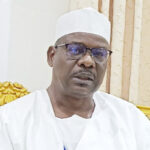The Northern part of Nigeria is somewhat of an autonomous division within Nigeria looking at it from the varying differences in cultures, norms, values and foreign relations. This makes it distinct from its counterpart; southern part of Nigeria. It is noteworthy that politicking in the northern part Nigeria is different from that of the south, especially in relation to human development.
Human development has to do with enlarging people’s freedoms, opportunities and improving their well-being. Therefore, a country, region or community whose physical growth is not commensurate with the level of human development, will one day find out that its growth becomes eventually unsustainable.
The real basis for social, economic and political progress is the development of the skills, knowledge and creative capabilities of the people. Therefore, development is fundamentally a human, rather than a technical and economic process. Human development is an important variable to ensure effective growth of a system.
Unfortunately, northern leaders shy away from important aspects of human development such as continuous development in education, improving health and living standards, security, shelter and nutrition.
Indeed, it is stunning to hear shocking revelations about the problems confronting the North especially from Muhammadu Sanusi II, and his friend, the governor of Kaduna State, Mallam Nasir Ahmad El-Rufai.
That day, at the 60th birthday of Mallam Nasir El-Rufai in Kaduna, Sanusi, the 14th Emir of Kano, said, “No leaders of the North would be happy in the face of the multifarious challenges confronting the region…there is the problem of drug abuse, Almajiri system of education and Boko Haram in the North”.
In the same vein, Governor El-Rufai said, during a Human Capital Development Strategy, meeting in Kaduna, that the North West region has human development indices that are closer to those of Afghanistan; adding that the region is afflicted with the highest number of out of school children and the highest poverty rate in Nigeria.
Similarly, Governor Aminu Masari of Katsina State noted that banditry and insecurity issues have kindled a long flame that can only be extinguished with sound education.
It is astonishing, though not surprising, to hear all these revelations from the elite and political leaders, because, it seems more like self-confession. These statements (situations) can best be described as a ‘hegemonic culture’, where the ruling class influences the values, norms, ideas, expectations and behaviour of the rest of the society, through social and religious institutions. Therefore, it becomes common values of all, thus maintaining the status quo. A simple example is the statement of most of our northern clerics who attribute all the suffering we are facing to our sins.
In the meantime, few politicians in the North are working hard and trying to turn the tide. Most of these leaders shun their duty of translating their power into meaningful and useful impact on the lives of their people, through human development. Therefore, there is need for prevention as the penultimate weapon and countermeasure against conflict, violence and subsequently, humanitarian and developmental crises.
In short, the most important way and initiative which can be used to improve human living based on high living quality is the provision of good health, security, improving education and providing essential health services which are all pre-requisite for human development.
Abdulazeez Alhassan wrote from Rigasa, Kaduna
 Join Daily Trust WhatsApp Community For Quick Access To News and Happenings Around You.
Join Daily Trust WhatsApp Community For Quick Access To News and Happenings Around You.


